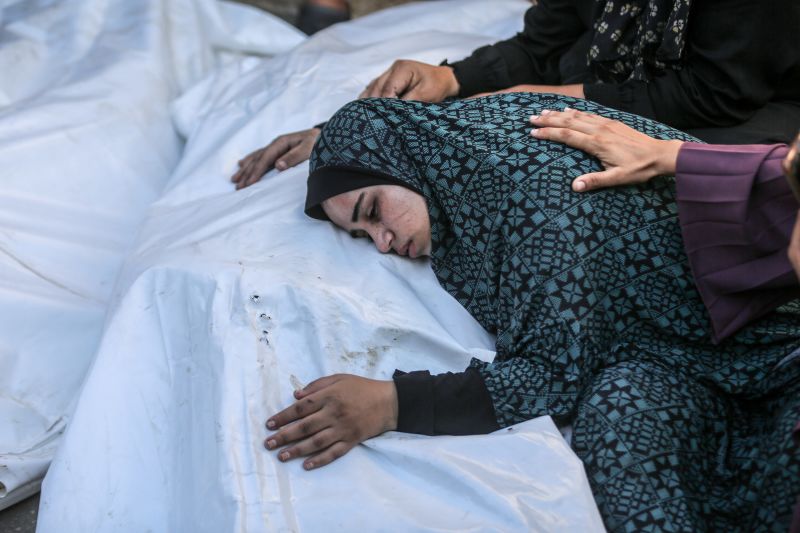
More than 40,000 Palestinians have been killed in 10 months of war in Gaza, health ministry says
More than 40,000 Palestinians have been killed in Gaza since Israel launched its war against Hamas, the health ministry in the enclave said Thursday, yet another dark milestone in the 10-month-old conflict.
The ministry said 40 people had died in Gaza during the past 24 hours, taking the total number of deaths since October 7 to 40,005 – about one in every 55 people in the enclave. More than 92,401 have been injured.
The soaring figures give a window into the daily suffering, malnutrition and volatility in Gaza after 10 months of conflict.
And the milestone has been passed at a particularly unpredictable point in the conflict. A new round of ceasefire talks are due to begin Thursday, after the killings of senior figures in Hamas and the Iranian-backed Lebanese militant group Hezbollah upended the leadership of both organizations and made the negotiations appear precarious.
The news follows an especially deadly weekend for Palestinians in the Gaza Strip. At least 93 people were killed overnight into Saturday when an Israeli strike hit a school and mosque in the eastern part of Gaza City where displaced people were sheltering, according to local officials.
The strike was almost universally condemned, including by some of Israel’s closest allies.
Fading hopes for a ceasefire
Israel launched its war against Hamas after the militant group’s cross-border October 7 attacks, in which more than 1,200 Israelis were killed and 250 taken hostage, according to Israeli authorities. More than 100 of those hostages remain in Gaza, their families back home pleading for a breakthrough to secure their safe return.
Hopes of a hostage-for-ceasefire agreement seemed to diminish in recent weeks after Israel launched a series of strikes against senior figures in Hamas and in Hezbollah, which has been sparring with Israel on a near-daily basis since October, in solidarity with Hamas.
But Egyptian and Qatari mediators have conveyed to Israeli officials in recent days that Yahya Sinwar, the new head of its political bureau following the assassination of Ismail Haniyeh in Tehran, wants a ceasefire deal, an Israeli source familiar with the matter said.
A hardliner and, according to Israel, one of the masterminds behind the deadly October 7 terror attacks, Sinwar was previously believed to be dismissive of a ceasefire and hostage release deal.
Hamas said Sunday it has asked mediators to implement a ceasefire plan based on previous ceasefire talks such as those put forward by US President Joe Biden and the UN Security Council in July.
International pressure is intensifying for Israeli Prime Minister Benjamin Netanyahu to reach an agreement with Hamas.
A drumbeat of Western criticism of Netanyahu’s actions has grown louder in recent weeks, with the election of a Labour government in the United Kingdom and the confirmation of US Vice President Kamala Harris as the Democratic nominee for November’s presidential election. Harris’ comments on Gaza signal a shift in tone from Biden’s steady support of Israel.
Harris said Saturday that “far too many” civilians have been killed in Gaza, saying a deal “needs to get done now.”
And Netanyahu faces anger from some quarters at home. The Hostage and Missing Families Forum, a powerful voice in Israel, has for months repeatedly called on Israel and Hamas to finalize a hostage-and-ceasefire deal.
“A deal is the only path to bring all hostages home. Time is running out. The hostages have no more to spare. A deal must be signed now!” the forum said in a statement last week.
A humanitarian catastrophe
A ceasefire deal would provide a reprieve for the approximately 2.2 million Palestinians who have been living in nightmarish conditions in Gaza.
Nearly everyone living in Gaza has been displaced in the conflict, with many people forced to flee repeatedlyas the Israeli military operation expanded, often into places it previously said had been cleared of Hamas fighters.
In recent days, some 75,000 people southwest Gaza after Israeli evacuation orders were issued, according to the United Nations Relief and Works Agency for Palestine Refugees (UNRWA) chief Philippe Lazzarini.
Less than a sixth of the area of Gaza is not under Israeli evacuation orders, Lazzarini said late last month.
“Quite often, people have just a few hours to pack whatever they can & start all over again, mostly on foot or on a crowded donkey cart for those who can afford it,” he said Sunday on the social media platform X.
Earlier this week Fikr Shalltoot, the Gaza Director for aid group Medical Aid for Palestinians, said the impending milestone “means that 40,000 families are grieving, and their hearts are broken.”
“Many people are losing hope and some are losing faith, but mostly people are losing trust in the international community. They are angry and disappointed and believe that the world has failed them and let them down,” she said in a statement.
This story has been updated.
